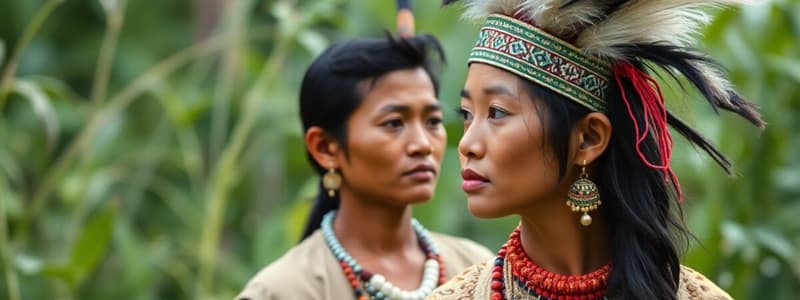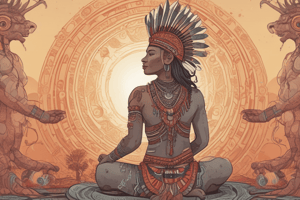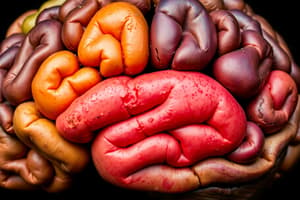Podcast
Questions and Answers
What is a characteristic of indigenous psychology as defined in the content?
What is a characteristic of indigenous psychology as defined in the content?
- It ignores the historical context of colonization.
- It is based strictly on subjective experiences of individuals.
- It relies exclusively on European psychological theories.
- It reflects and incorporates the sociocultural values of indigenous people. (correct)
Which aspect signifies someone as part of the indigenous population according to Martinez Cobo?
Which aspect signifies someone as part of the indigenous population according to Martinez Cobo?
- They reject their ancestral territories.
- They maintain dominant status in the society.
- They have historical continuity with pre-colonial societies. (correct)
- They possess a modernized lifestyle detached from their culture.
What signifies the process of Indigenisation?
What signifies the process of Indigenisation?
- The complete replacement of indigenous cultures with western theories.
- The dominance of non-indigenous perspectives over indigenous understanding.
- The development of indigenous knowledge and practices from local cultural contexts. (correct)
- The adaptation of indigenous practices solely based on western standards.
Which of the following correctly describes the first type of indigenous psychology mentioned?
Which of the following correctly describes the first type of indigenous psychology mentioned?
According to the content, which feature characterizes indigenous people's lives?
According to the content, which feature characterizes indigenous people's lives?
What is identified as a stage of Indigenisation?
What is identified as a stage of Indigenisation?
What is the hybrid approach in Enriquez's indigenisation perspective?
What is the hybrid approach in Enriquez's indigenisation perspective?
What does the 'ETIC' approach in indigenisation imply?
What does the 'ETIC' approach in indigenisation imply?
What does the term 'self-awareness' refer to?
What does the term 'self-awareness' refer to?
Which aspect best describes the difference between independent and interdependent self-construal?
Which aspect best describes the difference between independent and interdependent self-construal?
How do Indigenous Australians perceive their connection to the environment?
How do Indigenous Australians perceive their connection to the environment?
What does 'chronicity' refer to in self-description?
What does 'chronicity' refer to in self-description?
Which of the following is NOT a characteristic of interdependent self-construal?
Which of the following is NOT a characteristic of interdependent self-construal?
How do collectivist cultures usually define the self, according to self-construal theory?
How do collectivist cultures usually define the self, according to self-construal theory?
What key aspect is typically included in the holistic definition of Aboriginal health and wellbeing?
What key aspect is typically included in the holistic definition of Aboriginal health and wellbeing?
What was the primary finding of Hamilton and Biehal's study on self-construal?
What was the primary finding of Hamilton and Biehal's study on self-construal?
Which of the following describes the results of Mandel's 2003 self-construal study?
Which of the following describes the results of Mandel's 2003 self-construal study?
What impact did colonization have on indigenous cultures?
What impact did colonization have on indigenous cultures?
Flashcards are hidden until you start studying
Study Notes
Indigenous Psychology
- Focuses on culturally defined perspectives relevant to indigenous people, their values, and knowledge.
- Aims to understand indigenous experiences within their context.
- Two main types:
- Broader Indigenous Psychology applies to all residents of a country, often with a longer history.
- Traditional Indigenous Psychology focuses on the original inhabitants of a land, with shorter or non-existent histories.
Indigenous Peoples' Characteristics
- Martinez Cobo (1986) defined the characteristics of indigenous peoples:
- Historical continuity with pre-colonial societies.
- Distinctiveness from other sectors of society.
- Non-dominant position within society.
- Commitment to preserving and transmitting their culture.
- Deep connection to their ancestral lands and territories.
- Unique cultural patterns, social institutions, and legal systems.
Indigenisation
- The process of developing indigenous psychology, adapting knowledge and practices to local contexts.
- Stages of Indigenization:
- Acknowledging the limitations of Western theories.
- Adapting Western theories to local realities.
- Developing indigenous concepts and methods.
- Creating a self-perpetuating discipline independent of Western psychology.
Enriquez's Two Types of Indigenization
- ETIC/ Without
- Adapted versions of Western theories using indigenous language and context.
- EMIC/ Within
- Theories derived from indigenous cultures.
- Highlights what is missing from outsider perspectives.
- Creates new theories.
Indigenous Cosmology
- Origin narratives that explain the universe and our place within it.
- Explores questions of identity, purpose, and destiny.
- Different examples:
- Filipino: Rooted in Ethnic Psychology.
- Taiwanese: Influenced by Chinese history, culture, and language.
- Indian: Intertwined with Hinduism and folklore practices.
Indigenous Australians' Cosmology
- Deep connection between humans, nature, and the spiritual realm.
- Focus on social, religious, and spiritual activities.
- Emphasis on belonging and interconnectedness to land and ancestors.
- Each person has a defined role and responsibility within their community.
Colonization and its Impact
- Destroys indigenous cultures.
- Disrupts traditional ways of life.
- Marginalizes indigenous people.
- Impacts Indigenous Australian Culture:
- Colonization destroyed indigenous cultures.
- Government policies and practices impacted indigenous life.
- Indigenous Australians gained citizenship in 1967.
The Self
- Self-awareness: The act of thinking about ourselves.
- Self-concept: Our knowledge of who we are.
- Chronicity: Defining ourselves in ways that set us apart from others.
Two Types of Self-Construal
- Independent: Defining self through personal traits and valuing independence.
- Interdependent: Defining self through relationships and group memberships, valuing harmony.
Two Types of Interdependent Self-Construal
- Relational: Self-view incorporates close relationships.
- Collective: Self-view incorporates membership in a large group.
Self-Construal Studies
- Singelis (1994): Studied self-construal in Hawaiian students using the Self-Construal Scale.
- Hamilton & Biehal (2005): Examined the influence of self-construal on risk-taking behavior in advertising.
- Mandel (2003): Studied the effects of priming independence or interdependence on risk taking in different scenarios.
Indigenous Australians' Self-Concept
- Holistic approach to health and well-being.
- Encompasses the individual, family, community, land, ancestors, and spiritual existence.
- Challenges Western ideas of the self.
Studying That Suits You
Use AI to generate personalized quizzes and flashcards to suit your learning preferences.



